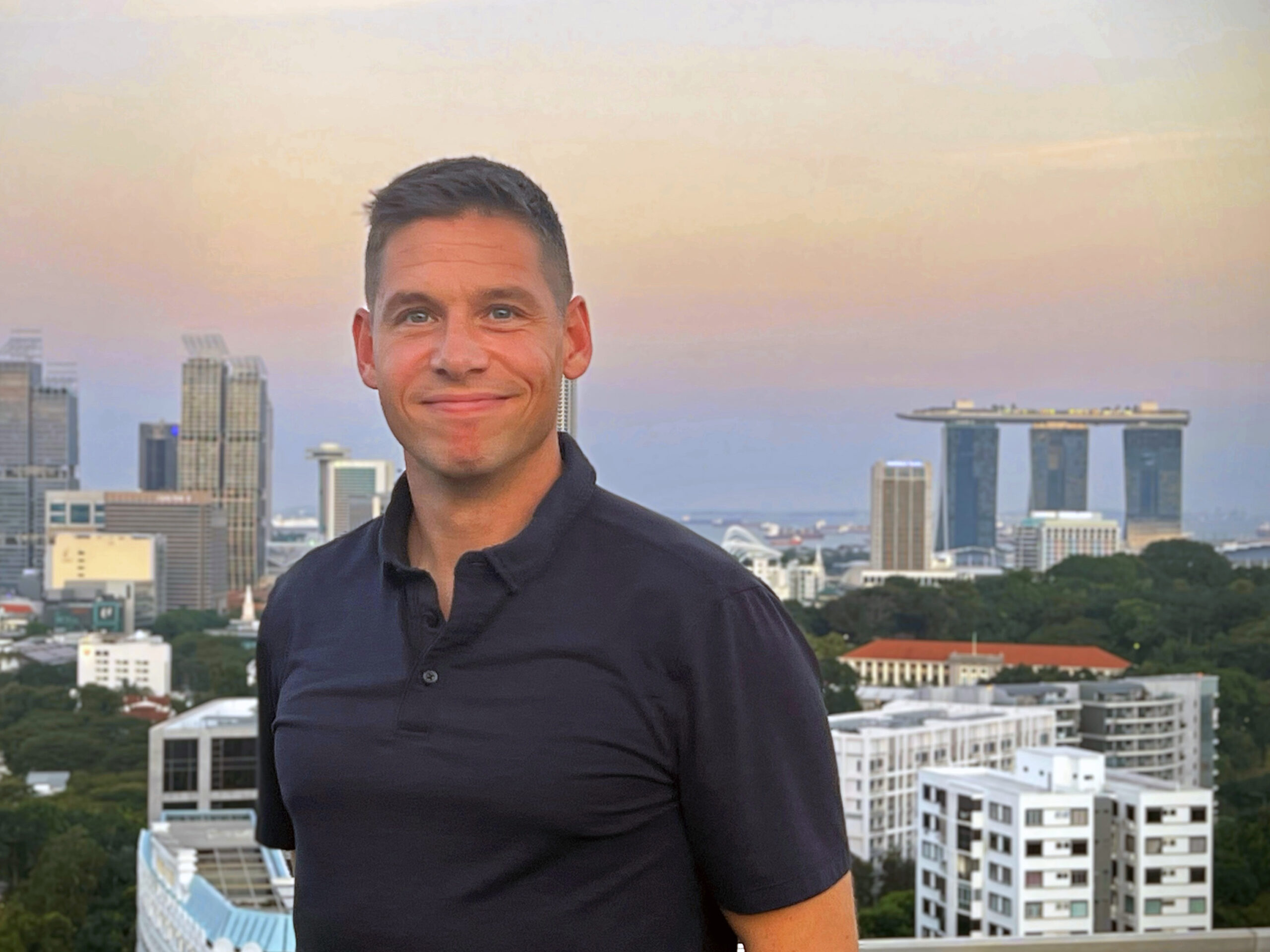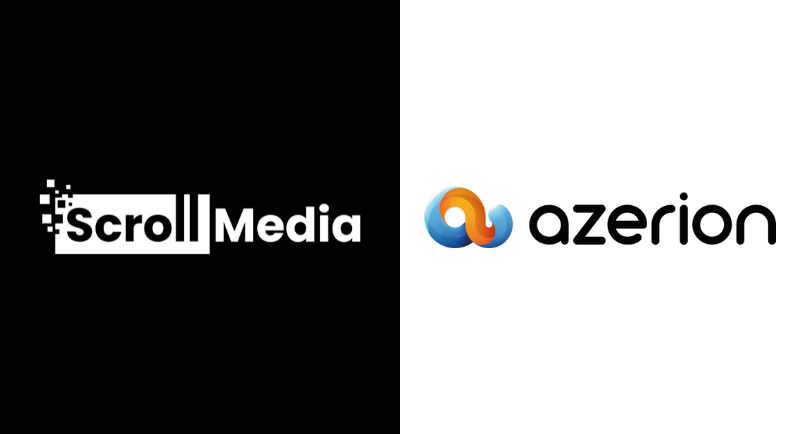Tuesday April 8, 2025
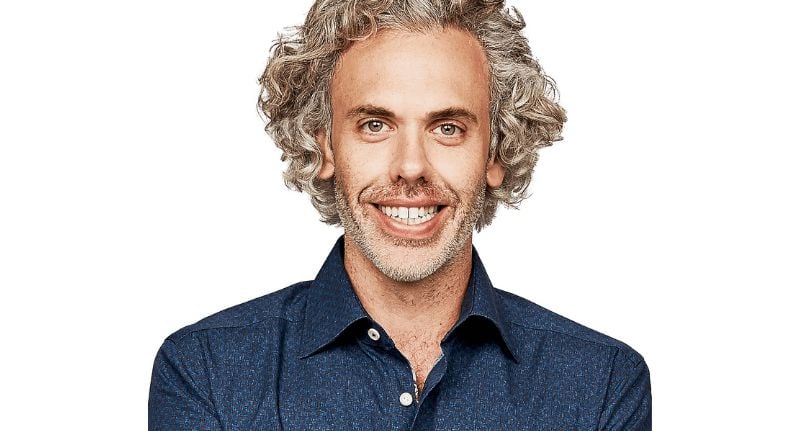
How to pitch a story to radio: Inside tips from Fitzy & Wippa with Kate Ritchie’s EP
If you’re a brand, agency or publicist aiming to land a spot on one of Australia’s top-rated breakfast shows, you’re going to need more than a catchy subject line.
Nova’s Fitzy & Wippa with Kate Ritchie executive producer Tom Ivey has fielded thousands of pitches across his 20-year radio career, and he knows exactly what cuts through the noise.
With a background that spans SAFM, 2Day FM, Triple M, and Nova, Ivey’s been EP of Fitzy & Wippa since its launch 14 years ago.
These days, the show boasts its highest-ever audience, 668,000 weekly listeners, and sits as the second most listened-to breakfast show in Australia. For advertisers, that means visibility. For Ivey, it means a very full inbox.
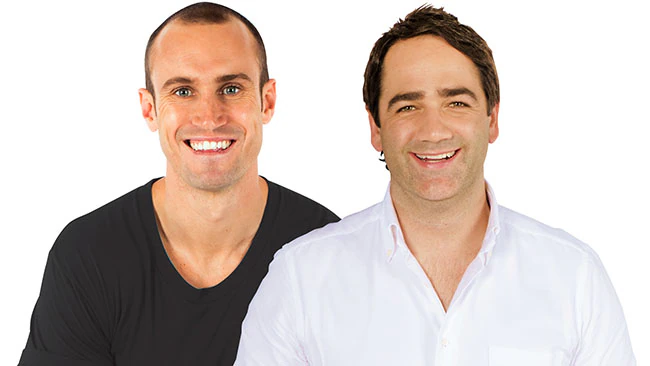
Ivey has been working with Fitzy & Wippa since they looked like this…
Tom’s inbox: what gets read, what gets binned
“I get somewhere between 20 and 30 pitches every day,” Ivey tells Mediaweek. “Of the 100 pitches I get per week, roughly three or four might make it to air.”
That’s a high bar, and first impressions matter.
“I’ve lost count of how many people begin their emails with ‘Hi Tim.’ If the idea is strong enough, it can still make it through because I’m learning to put my ego aside,” he jokes.
What definitely won’t help your cause?
Gimmicky greetings.
“FRIYAY, TGIF, and ‘Hey legend!’ are all awful ways to begin your pitch,” says Ivey. Instead, show you’ve done your homework. “Begin your email with something like: ‘I heard your team talking about [insert topic here] the other day, so I thought I’d get in touch.’ It goes a long way if you’ve taken the time to listen to the program you’re pitching to.”
When (and how) to follow up
Want to make Ivey’s list of producer icks? Call after you’ve emailed just to say you’ve emailed.
Worse? “Please don’t call to discuss that pitch at 4pm. My alarm clock goes off at 3:50am every morning. How would you like it if I did that to you?” he quips.
If you haven’t heard back, Ivey says patience is key. “You’ll get the most from me if you follow up by email a day or so later. If it’s been a week, it may mean the pitch wasn’t quite right for us.”
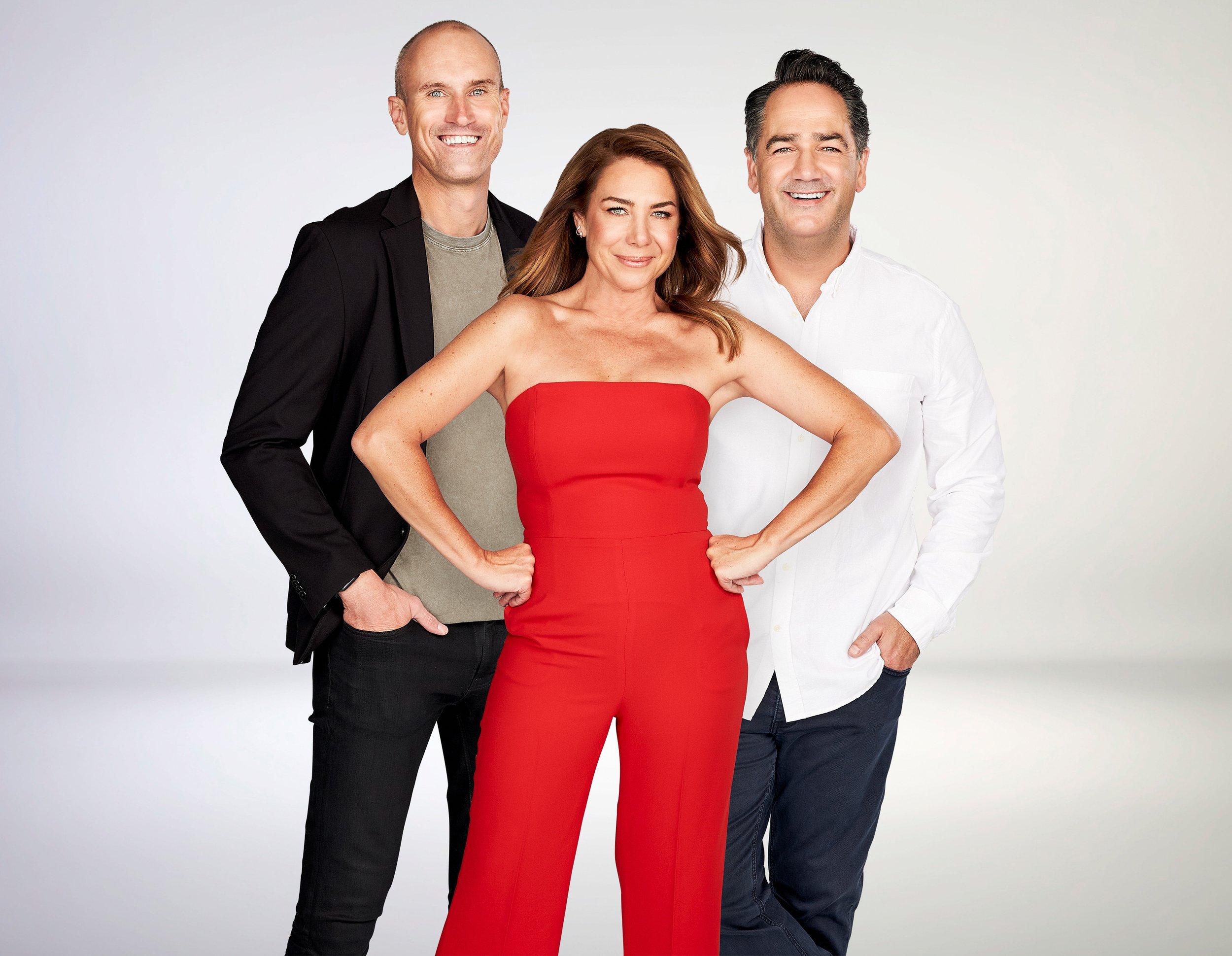
Ivey is the current executive producer for Fitzy & Wippa with Kate Ritchie on the Nova network.
What does make a great pitch?
Keep it brief. Be clear about why your idea, guest, or product matters to Fitzy & Wippa listeners. “Exclusivity is always preferable, but I understand a publicist’s need to cast the net wide… just don’t mention the wrong breakfast show in your pitch.”
A thoughtful pitch that understands the show’s tone, talent and format will always go further. “Listen to the show. Know something about the talent you’re pitching to. It will honestly go such a long way,” says Ivey.
“If you have suggestions for how your product or talent can integrate into the show, that’s always welcome.”
One last thing? “Never deliver perishable food to a breakfast show on a Friday afternoon as most talent have left the building.”
The (non perishable) takeaway for brands and agencies
Radio is still a high-impact, high-reach medium, especially when integrated into formats with loyal audiences and strong brand equity. For agencies, landing coverage on shows like Fitzy & Wippa can mean major cut-through, but only if approached with relevance, respect and creativity.
Pitch smart. Pitch well. And for the love of audio, get the producer’s name right.
Pictured: Tom Ivey

Streaming’s surge signals new era for Aussie TV ads, says Samsung ads boss
Australia’s streaming boom shows no signs of slowing, and according to Alex Spurzem, managing director of Samsung Ads Southeast Asia and Oceania, it’s reshaping not just how Australians watch TV but also how advertisers should spend their budgets.
Speaking exclusively to Mediaweek, Spurzem revealed that streaming now accounts for 71% of all time spent on Samsung Smart TVs in Australia. Just five years ago, that figure was a 50/50 split with linear television. This shift isn’t merely generational; it’s foundational.
“Streaming is the new norm,” Spurzem said. “A third of new Samsung TVs aren’t even being connected to an antenna. That’s a clear signal from consumers that traditional broadcast is no longer their default.”
Linear isn’t dead, but it’s no longer dominant
Despite the shift in the way consumers watch TV, Spurzem is quick to caution against declaring the death of linear TV. “Free-to-air still dominates major cultural moments, live sports, breaking news, national events,” he said. “But the reach it once delivered month-to-month is no longer guaranteed.”
Samsung’s analysis of over 250 linear TV ad campaigns found that ‘cord-cutters’ and ‘cord-nevers’, viewers who have either left linear TV or never subscribe, now account for one in four Australian viewers. This is a growing audience unreachable by broadcast alone.
What’s more, a deeper look at ad effectiveness shows a troubling imbalance: 41% of all linear TV ad impressions are hitting just 8% of households, what Spurzem calls “heavy viewers.”
“That kind of saturation leads to ad fatigue and wasted spend,” he warned. “Advertisers are missing the rest of the market, which is increasingly fragmented across streaming platforms.”
Ad-supported streaming the next frontier
While subscription video on demand (SVOD) services still dominate total time spent, the fastest-growing segment is ad-supported streaming. In fact, Samsung Ads reports that ad-supported streaming is growing 8% faster than SVOD.
Several major platforms, including Netflix, Disney+, and Prime Video, have launched ad tiers in Australia over the past 12 months, opening up new advertising inventory in previously walled-off ecosystems.
This aligns with recent Kantar research, which found that Australians increased their streaming spend in Q4 2024 despite rising subscription costs, with many opting for more affordable ad-tier plans.
“Ad tiers are the future,” said Spurzem. “They’re a path to profitability for platforms, and they offer brands access to audiences who were previously unreachable.”
He estimates that advertisers now have access to 40–50% of previously ad-free SVOD audiences thanks to these changes.
Budgets must catch up to viewer habits
One of the biggest hurdles isn’t consumer behaviour, it’s advertiser hesitation.
“Ad dollars have been much slower to move than audiences,” said Spurzem. “There’s still a misconception that shifting to streaming requires budget increases. But really, it’s about rebalancing.”
Samsung Ads’ work with Nielsen revealed that shifting 30% of a total TV budget to streaming could significantly increase reach and campaign efficiency. A newer study by the Video Futures Collective, supported by GroupM and Adgile, now recommends increasing that number to 40% of total video spend.
“We’re not talking about spending more, just spending smarter,” Spurzem noted.
A hybrid future for TV
So what’s next for Australian TV advertising?
Spurzem points to international markets for clues. In the U.S., streaming ad spend is forecast to match linear for the first time in 2025. Meanwhile, New Zealand broadcaster TVNZ has publicly committed to a fully digital future, with ambitions to triple digital ad revenue.
“The real change is that streaming will become the baseline, and linear will become the incremental reach layer,” Spurzem predicted.
He also sees a shift in industry mindset: “It’s no longer ‘streaming versus linear.’ It’s about redefining what TV means in a connected, data-driven world.”
The result? A hybrid model where streaming and broadcast co-exist, and where success hinges on marketers’ ability to find unduplicated reach across platforms.
“The smartest advertisers are already adapting,” Spurzem said. “They’re moving faster with their ad dollars to where audiences actually are. Those who don’t risk being left behind in an increasingly digital-first TV ecosystem.”
As the lines between traditional TV and streaming continue to blur, one thing is clear: the revolution is already here, and the advertisers who embrace it early will come out on top.
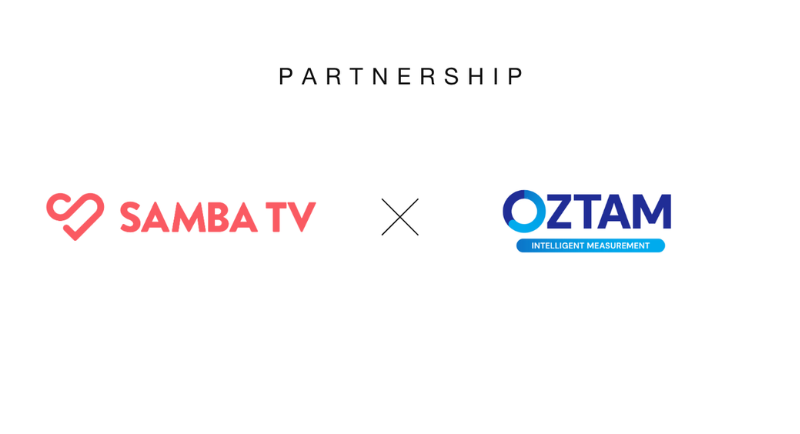
OzTAM teams up with Samba TV and Nexxen team up to power the future of TV measurement
OzTAM has teamed up with Samba TV and Nexxen to launch of a proof-of-concept (POC) project to explore new measurement possibilities for Australia’s media industry.
The POC is scheduled to run across 2025 with Phase 1 set to scope the big data opportunities and benefits. In Phase 2, the project will engage with industry leaders to design a detailed integration roadmap to combine new data sources with OzTAM’s robust measurement panel data – ultimately fuelling the next evolution of audience measurement. A tender process for a production partner is also in motion, focused on aligning cutting-edge technologies and AI with the unique needs of the Australian market.
The POC partnerships with technology leaders Samba TV and Nexxen will leverage their vast datasets, sourced from more than 2.2 million connected TV sets and representing an audience of over five million individuals.
In tandem with OzTAM’s representative panel of 8,500 panel homes – selected from 65,000 Establishment Survey respondents annually, including 4,600 Streaming TV Meters and with 16 million connected devices – this integration of big data marks an unprecedented step toward reshaping how total video consumption is measured in Australia.
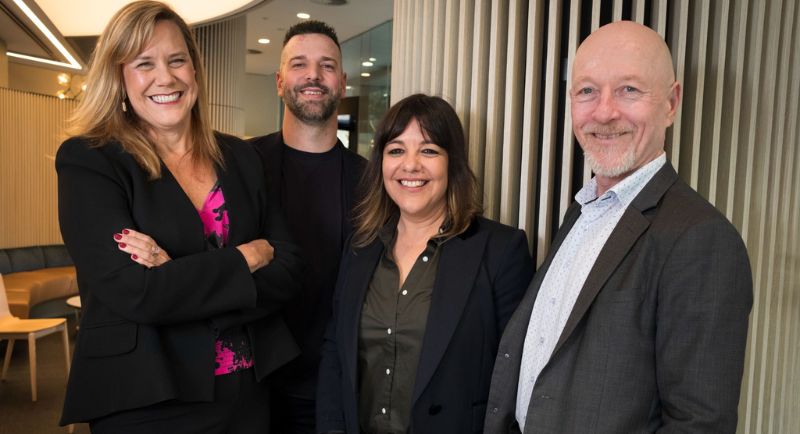
Karen Halligan, Josif Zanich, Yasmin Sanders
Globally reshaping audience measurement
“The global expansion of connected TV adoption and high-speed internet is unlocking a new era of audience data that promises to transform how we understand and measure viewership,” Karen Halligan, OzTAM CEO, said.
“We are excited to collaborate with Samba TV and Nexxen to integrate big data with our established panel data, taking our Total TV measurement service to new heights. This next step in moving towards incorporating big data into the trading currency is not just a game-changer – it’s the future of audience measurement.”
Yasmin Sanders, Samba TV APAC managing director said: “As OzTAM elevates Total TV measurement to the next level, the impact for agencies, advertisers, and broadcasters will be transformative.
“Samba TV pioneered ACR technology to bring accuracy and scale to viewership measurement, and by combining our diverse first-party dataset with OzTAM’s trusted framework, we’re setting a new standard.iThis partnership delivers comprehensive precision and actionability that brands and broadcasters need to navigate today’s evolving viewing landscape with confidence. This isn’t just an evolution—it’s a bold step toward a smarter, more transparent future for audience measurement in Australia.”
Samba TV’s CEO, Ashwin Navin, said: “The Australian media industry prides itself on innovation and OzTAM is no exception as the first JIC to embrace big data from a neutral provider within a currency product.”
“As the pioneer in ACR technology for viewership data and cross-platform measurement, we are beyond thrilled to see OzTAM modernize the methodology with viewership data from a multitude of TV brands that capture the geographic, cultural and economic diversity of Australia better in the future. Samba generates the world’s most diverse first-party dataset and this partnership delivers comprehensive precision, scale, and actionability that media buyers and sellers need to transact with confidence.”
Josif Zanich, managing director JAPAC at Nexxen, said: “We’re thrilled to partner with OzTAM on this proof-of-concept, bringing our scale and expertise in data-driven insights to the evolution of TV measurement in Australia.”
“With viewing behaviours becoming more fragmented than ever, it’s critical to have a measurement approach that captures the entire audience journey. By combining Nexxen’s unique and extensive dataset with OzTAM’s trusted panel, we aim to deliver a more holistic view of how people engage with TV content, providing greater clarity and value to advertisers and broadcasters alike.”
In the TV measurement space, big data refers to a combination of return-path data (RPD) from cable and satellite set-top boxes, alongside automatic content recognition (ACR) data from internet-connected smart TVs. Adoption of this meshed-data approach is already reshaping audience measurement globally.
This announcement further solidifies OzTAM’s leadership in audience measurement innovation. Over the past six months alone, OzTAM has transitioned the market to VOZ Total TV currency, launched VOZ Streaming, and expanded its Streaming TV Meters in panel homes, with more announcements to come.
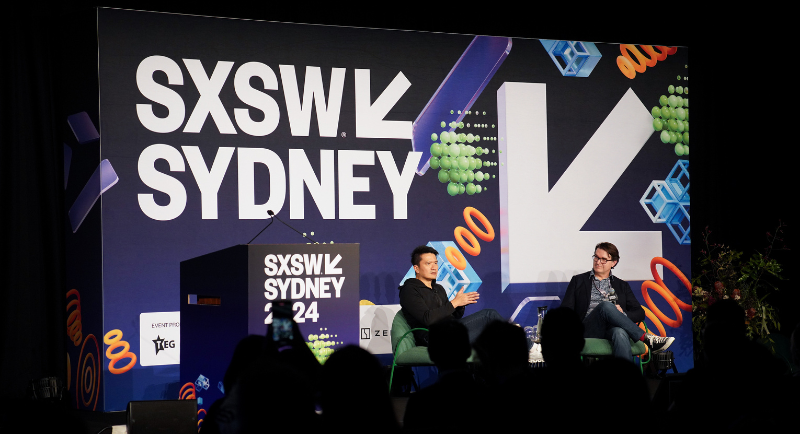
SXSW Sydney unveils speakers at 2025 conference
South by Southwest Sydney (SXSW Sydney) has revealed 40 speakers for its 2025 Conference, with this early announcement indicating the 3rd edition of the annual event is set to deliver an extraordinary lineup of global thought leaders, creative pioneers, and industry disruptors.
This year’s event will dive deep into the most pressing trends shaping our world—from AI’s accelerating advancements and the future of work to quantum technologies, cybersecurity, sustainability, and the ever-evolving creative industries. A must-attend event for professionals and innovators in leadership roles, SXSW Sydney will be held from October 13-19.
Fenella Kernebone, SXSW Sydney head of conference, explained: “You’ll experience dynamic keynote sessions, powerhouse panel discussions, and hands-on industry workshops that deliver practical skills you can apply immediately. With a focus on innovation, leadership strategies, and experience-driven learning, you’ll gain fresh perspectives to help you implement meaningful change in your organisation. This first release of speakers is just the beginning – prepare to build an even more comprehensive toolkit as we announce many more industry leaders!”
In Business & Leadership, discover how Tim Cadogan, CEO of GoFundMe, is using the data from millions of campaigns resulting in $30 billion in fundraising to implement AI-informed technology that enhances sharing, storytelling and overcomes the psychological barriers that prevent people from asking for help. Dr Kirstin Ferguson AM will provide with actionable frameworks for inclusive leadership, organisational transformation, providing tools to foster gender equality within your own business.
Within Technology and innovation, gain strategic insights from Silvija Martincevic, CEO of Deputy, who will demonstrate how AI-powered workforce technologies are creating data-driven systems that boost productivity. In addition, a rare in-conversation with Dr. Karl Kruszelnicki, unpacking his ability to demystify complex concepts with infectious enthusiasm.
Marketing and media, learn from Tiffany Rolfe (global chair/global chief creative officer at R/GA – New York), who will show you how to develop strategic creative solutions that blend storytelling with technology to drive your business growth. Peter Greste (professor of journalism at UQ) will draw on his frontline experience to equip you with crucial frameworks for navigating today’s complex media landscape, offering invaluable perspectives on information integrity.
Additional speakers at SXSW Sydney this October include:
• Ethical Technologist Andi Mastrosavas, CEO of Pladia, a trailblazer reshaping digital responsibility
• Visionary Robotics Leader Andra Keay, Managing Director of Silicon Valley Robotics
• Consciousness Explorer Dr. Ariel Zeleznikow-Johnston, Neuroscientist & Author of “The Future Loves You”
• Public Policy Architect Aruna Sathanapally, CEO at Grattan Institute
• Groundbreaking Cultural Commentator Benjamin Law, Journalist, Screenwriter and Broadcaster
• Global Digital Policy Shaper Brendan Dowling, Australian Ambassador for Cyber Affairs and Critical Technology
• Space Nutrition Expert Flávia Fayet-Moore, Founder and CEO of FOODiQ Global, revolutionising astronaut diets
• Game-Changing Sports Executive Jennie Sager, CEO of the Women’s National Basketball League (WNBL)
• World Surf League Commissioner, Jessi Miley Dyer and former Pro Surfer, shaping the future of the sport
• Quantum Physics Luminary Prof Jim Rabeau, CEO of DeteQt, transforming sensing technologies
• Leading Audio Content Strategist Josh Lindgren, Head of Podcasts at CAA, influencing the future of podcasting
• Advocate for Creative Innovation, Julie Eckersley, Award-winning Producer and Screen Executive
• Iconic Science Communicator Dr. Karl Kruszelnicki, Julius Sumner Miller Fellow at University of Sydney
• Elite Cyber Security Strategist Katherine Mansted, Executive Director of Cyber Intelligence at CyberCX
• Global Authority on Ethical Leadership Kirstin Ferguson AM, Author, Columnist, and Leadership Expert
• Change Maker Kyah Bell, Co-Founder of the Black Excellence Fund
• Champion of Evidence-Based Journalism Lisa Watts, CEO of The Conversation
• Barrier-Breaking Technology Leader Luli Adeyemo, Executive Director of TechDiversity
• Defining Voices in Women’s Media Mia Freedman, Jessie Stephens and Holly Wainwright of Mamamia Out Loud
• Compelling Political Analyst Matt Bevan, Host and Writer of ABC’s If You’re Listening podcast
• International Emmy-Award Winner Neil Sharma, Writer and Director of captivating visual narratives
• AI Educator Nicholas Renotte, Head of AI Developer Advocacy at IBM, democratising advanced technology
• Creative Potential Unleasher Nicole Velik, Founder of The Ideas Bodega
• Cutting-Edge AI Transformation Strategist Noelle Russell, AI Executive highlighting the way forward
• Fearless Defender of Press Freedom Peter Greste, Professor of Journalism at UQ, former Foreign Correspondent
• Award-Winning Actor Remy Hii, featured in Netflix’s ARCANE, WELLMANIA and Crazy Rich Asians
• Trailblazing Indigenous Aerospace Leader Renee Wootton, Director, New Market Development at Lanzajet
• Tourism Redefiner René de Monchy, Chief Executive of Tourism New Zealand
• Media Futurist Ricky Sutton, Host of Future Media Podcast, predicting industry transformations
• Boundary-Pushing Performer Shuang Hu, Actor and Creator bridging eastern and western artistic traditions
• Modern Workplace Global Executive, Silvija Martincevic, CEO of Deputy
• Financial Empowerment Icon Simran Kaur, Founder of Girls That Invest, revolutionising women’s wealth creation
• Sustainable Food Production Innovator Stela Willemstein, Director of JBS
• Digital Brand Innovation Definer Tiffany Rolfe, Chair & Global Chief Creative Officer at R/GA
• Global Giving Tech Leader Tim Cadogan, CEO of GoFundMe, transforming how communities mobilize support
• LGBTQ+ Business Inclusion Pioneer Todd Sears, US Founder & CEO of Out Leadership, driving corporate change
• Creative APAC Powerhouse Valerie Madon, Chief Creative Officer, McCann Worldgroup Asia Pacific
• Science Sleuth Wendy Zukerman, Host and Executive Producer of Science Vs
SXSW Sydney 2025 will again feature 1,600 sessions and events – 400+ conference sessions, 150+ professional development sessions, 300+ music performances, 95 film screenings, 150 games, and more than 400 brand-led events. Hundreds more conference sessions are up for public vote here until April 11.
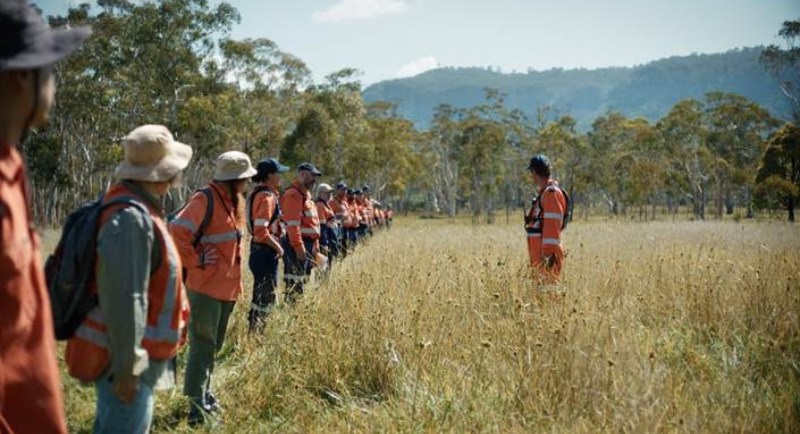
ALDI makes ‘Quality is Easy to Find’ in new campaign via BMF
ALDI Australia has launched a new campaign aimed at Australian shoppers in search of high quality products at every day low prices with long-time agency partner BMF.
The ‘Quality is Easy to Find’ campaign opens to a tense briefing between a search leader and his volunteers in remote bushlands. As the team embarks on what is expected to be a long and tenuous mission, the search is swiftly called off just as it begins.
A member of the search party quickly finds what they have all been looking for – ALDI’s Deli Originals Traditional Style Hommus, proving that quality is easy to find at ALDI since that is all ALDI stocks.
“ALDI isn’t about offering endless options, we are about offering Aussie shoppers the right one,” Jenny Melhuish, marketing director at ALDI Australia, said.
“Every single product on ALDI’s shelves is benchmarked against customer favourites and category leaders, enduring multiple quality tests and reviews to ensure it meets our incredibly high standards.”
“If it doesn’t stack up, it simply doesn’t make the cut because quality shouldn’t be something you have to search for. At ALDI, it’s right there in front of you. With a carefully curated range of 1,800 core range products, we make it easy for shoppers to find high quality items at unbeatable prices every day.”
David Fraser, executive creative director at BMF, said: “Nobody wants to spend more time scouring supermarket shelves, comparing labels, and questioning their hommus choices. So ALDI keeps it simple and only stocks the very best.”
The integrated campaign will air across TV, cinema, radio, OOH, social, owned channels, and PR.
CREDITS
Client: ALDI Australia
Creative Agency: BMF
Production Company: Revolver
Director: Steve Rogers
Music and Sound House: Rumble Studios
Editor: Bernard Garry
Post Production: The Editors & Blockhead
Media Agency: Zenith Media
PR Agency: Ogilvy PR
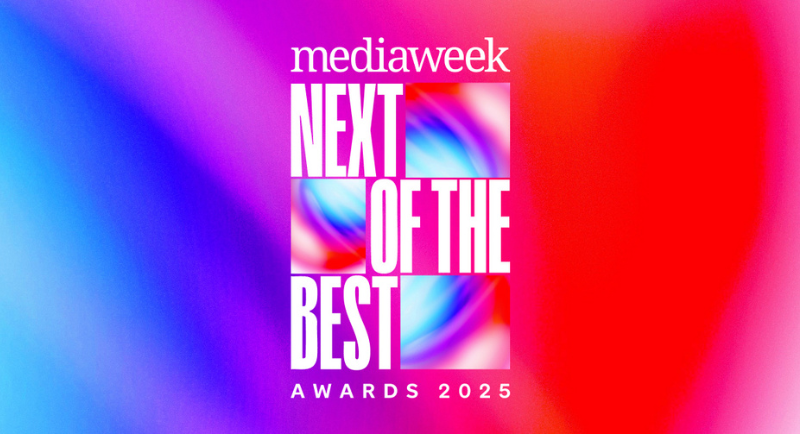
Mediaweek’s Next of the Best Awards: Entries are now open
Mediaweek has opened entries for Next of the Best Awards 2025, which celebrates the trailblazers and emerging leaders in advertising, media, and marketing.
These prestigious awards are dedicated to honouring the talented leaders of today and tomorrow who are shaping the future of Australia’s media landscape.
Next Of The Best recognises the industry’s rising stars based on their impact, success and contribution to their company, sector or the wider industry in the last 12 months.
These are not age-based awards, but open to anyone who has been working in their current field or role for 15 years or less.
Enter Mediaweek’s Next of the Best 2025 here
A distinguished panel of judges will select the winning candidates from a shortlist, and we will honour these trailblazers with a night they will never forget, on Friday 13 June, 2025 at W Sydney, celebrating the next wave of industry leaders, change-makers and creative forces.
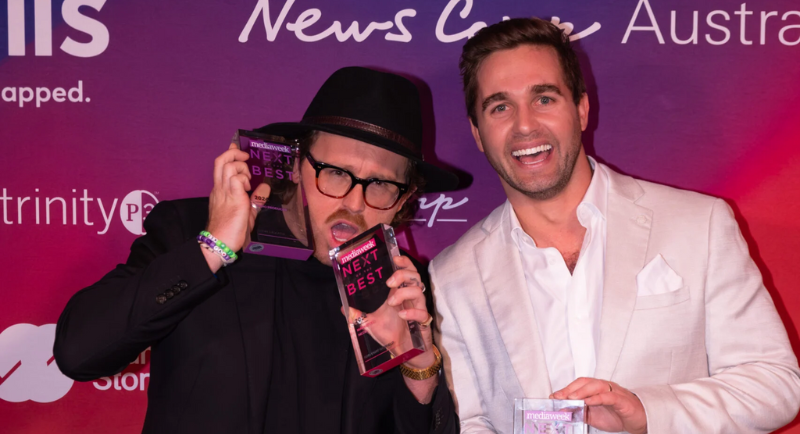
Jimmy and Nath from 2DayFM won Best Audio Talent at last year’s awards.
This year, there are 15 awards with new categories to reflect the ever-changing media and advertising landscape.
The Mediaweek Next of the Best Awards are:
Audio Talent (Host, Producer, Creator)
Recognising professionals who drive growth, innovation, and engagement in the audio and podcasting industries.
Marketing Talent
For professionals making waves in marketing through successful campaigns and innovative thinking.
Journalist (Print, Radio, TV, Digital)
Celebrating journalistic excellence with a focus on audience impact and storytelling.
Advertising Creative
Recognising creative talent shaping advertising through originality, campaign success, and audience engagement.
Marketing Strategist
For those excelling in strategic marketing, data-driven decision-making, and audience segmentation.
Digital/Social Content Creator or Influencer
Honouring digital creators who have demonstrated growth, creativity, and monetisation success.
Publicist (Agency/In-House)
Recognising rising publicists who have successfully shaped media narratives and public perception.
AdTech Specialist
Honouring professionals leveraging AdTech innovations to enhance digital advertising effectiveness.
Media Salesperson
Recognising media sales professionals driving revenue growth through strategic thinking and strong client relationships.
Media Planner & Buyer
Celebrating planners and buyers who excel through innovative thinking, data-driven decision-making, and impactful campaign execution.
Publishing Innovator
Recognising emerging talents in publishing who are redefining the industry through editorial excellence, and audience growth across print and online platforms.
TV & Film Production
Recognising the talent behind the camera of on-screen content production from the big to the small screen through creativity and commercial success.
Leadership
For exceptional leadership and impact at senior or executive level.
Changemaker
Recognising individuals who have made a significant impact in driving change, innovation, or transformation.
Nominate yourself or someone else for a Mediaweek Next of the Best Award now.
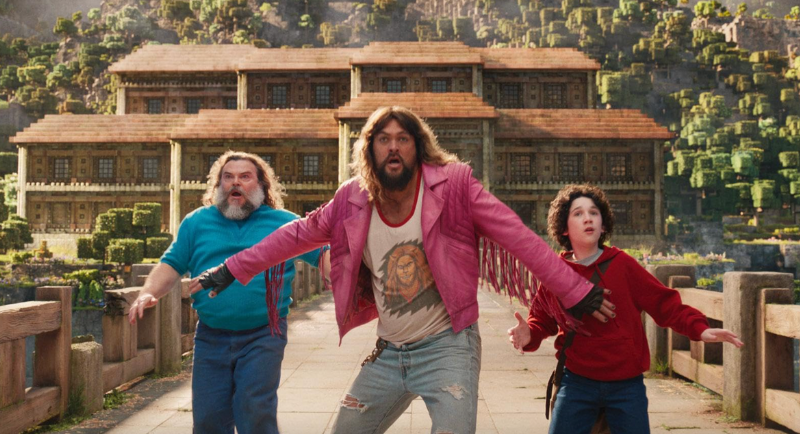
Box Office: A Minecraft Movie takes the top spot from Disney’s Snow White
This weekend, the Australian box office grossed $17,720,533, up +110% from last weekend’s $8,444,600.
Top five
1. A Minecraft Movie
A Minecraft Movie has claimed the top spot as it made its Australian box office debut over the weekend, screening across 725 cinemas and raked $13,686,459. The American fantasy adventure comedy film stars Jason Momoa, Jack Black, Danielle Brooks and Emma Myers and is based on the 2011 video game Minecraft by Mojang Studios.
Synopsis: A portal pulls four misfits into the Overworld, a land made of cubes shaped by imagination. To return home, they must learn the terrain and complete a quest with a crafter named Steve.
Total Australian Box Office gross to date: $13,686,459
2. Dog Man
The American animated film, based on children’s graphic novel series of the same title, also made its debut at the Australian box office over the weekend across 410 screens. Dog Man features the voices of Pete Davidson, Lil Rel Howery, Isla Fisher, and Ricky Gervais.
Synopsis: When a police officer and his police dog are injured in the line of duty, a surgery combines them into one being, creating Dog Man. As Dog Man adapts to this new form, he must stop Petey the Cat from creating a clone and committing crimes.
Total Australian Box Office gross to date: $1,982,906
3. A Working Man
Synopsis: The action/thriller drops down one spot to third place after debuting at number two at the Australian box office last weekend. This weekend, the Jason Statham film made $746,874 after screening across 299 cinemas a drop of -56% from last weeks earning of $1,710,539.
Synopsis: After the passing of his wife Levon Cade, a former Royal marine, moves into construction business and to focus on being a dad to his daughter. But when a his boss’s daughter vanishes, he is asked to use his specific set of skills that made him known in the world of counter-terrorism.
Total Australian Box Office gross to date: $2,930,723
4. Disney’s Snow White
The Disney live action remake has slipped down to fourth place over the weekend in its fourth week at the Australian box office. Over the weekend, the film was screened across 333 screens and grossed $637,057, -64% less than its third week earnings of $1,756,193 after screening across 450 cinemas.
Synopsis: Rachel Zegler stars as Snow White and the film centres on her journey to free her kingdom alongside the seven dwarfs, Bashful, Doc, Dopey, Grumpy, Happy, Sleepy, and Sneezy, from her ruthless stepmother, the Evil Queen, played by Gal Gadot.
Total Australian Box Office gross to date: $6,184,912
5. Novocaine
Novocaine also makes its debut at the box office, making $525,843 after screening 286 cinemas. The American action comedy film stars Nate (Jack Quaid), quiet man with a rare condition that blocks pain, use his unique inability to save his girlfriend when she is taken hostage in a bank robbery.
Total Australian Box Office gross to date: $586,116
Top six to ten
6. Black Bag
7. Mickey 17
8. Bridget Jones: Mad About the Boy
9. Sikandar
10. Flow
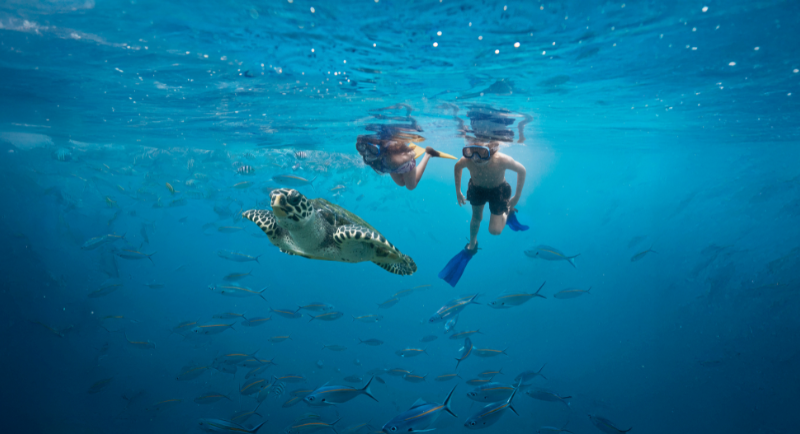
Tourism Fiji invites tourists to the world's first ‘Happy Hour for the Environment’ via Havas
Tourism Fiji and Havas have teamed up to launch Loloma Hour, the world’s first ‘Happy Hour for the Environment’ that invites travellers to swap cocktails for conservation.
The concept redefines ‘happy hour’ by giving visitors the chance to turn a portion of their holiday time into meaningful environmental and cultural action.
Loloma Hour makes it easy for travellers to leave a positive legacy in Fiji—all in just an hour whether that is through planting coral, restoring mangroves, or engaging in cultural traditions.
The launch positions Fiji as a proactive leader in sustainable tourism as consumer demand for sustainable tourism grows, with 75% of global travellers expressing a desire to travel more sustainably in the next 12 months.
Program development was inspired by the Fijian value of ‘Loloma’, meaning to act with generosity, driven by love, a value deeply rooted in Fijians’ way of life and care for the environment and culture.
A small but meaningful impact with Tourism Fiji
With curated activities across four key pillars—wildlife, community, coastline and reef—Loloma Hour is an appeal to a broad range of travellers including families, young couples, empty nesters, and solo travellers who want a meaningful way to meet people while travelling.
The initiative has been designed to maximise engagement and uptake by making sustainable action simple, accessible, and fun. Tourism Fiji will measure the tangible impact through hours contributed to sustainability initiatives, with a launch target of over 5,000 Loloma hours in year one.
“Fijians know genuine, long-lasting happiness is found in what you can do for others. It comes from what you can give back, not from what you get. Loloma Hour shows it only takes a small amount of time to make a big difference,” Srishti Narayan, Tourism Fiji’s chief marketing officer, said.
“Over time, the potential multiplies. The more people who take part, the more powerful the ripple effect – both environmentally and culturally. But beyond the numbers, it’s about the quality of the experience. Loloma Hour offers travellers a way to connect more deeply with Fiji, to be part of something purposeful, and to leave with a story that goes beyond the typical souvenir.”
Visitors who want to do their part and learn at the same time can join activities such as guided nature walks, culture talks, Fijian language classes, mangrove and coral planting, giant clam cleaning, and fish house building — all made available across partner hotels and resorts, tourism operators and partners throughout Fiji.
Sebastian Vizor, Havas executive creative director, said: “Sustainable travel doesn’t have to be expensive or complicated. Loloma Hour makes it simple—an easy, accessible way for visitors to give back to the beauty and generosity Fiji shares with them.”
“By tying the simple ask for at least 60 sustainability-focused minutes of a visitor’s holiday time to the happiness created by making a meaningful environmental or cultural impact, the campaign flips the script on traditional tourist offerings, giving ‘happy hour’ an entirely new, more significant meaning.”
Global reach, local impact
Launching April 8, 2025, Loloma Hour will partner with the BBC to reach eco-conscious travellers across Australia, New Zealand, Canada, and the USA through a strategic media approach. Under Loloma hour’s two “Land” and “Culture” pillars, content from the BBC will highlight Fiji’s sustainability efforts on indigenous species conservation, cultural preservation, coral reef rehabilitation, and coastline protection. These articles will feature interviews with marine biologists and cultural hosts, showcasing how visitors can engage with Fiji’s natural and cultural heritage while supporting sustainability efforts.
The media partnership brings the Loloma Hour to life through breathtaking visuals and emotionally charged storytelling, creating experiences that transport audiences straight to Fiji. Through dynamic content and innovative media placements across social media, it ensures this powerful moment reaches and resonates with audiences at scale—leaving them dreaming of Fiji long after they’ve seen it.
Influencer Pacha Light (surfer and environmental activist), participated in Loloma Hour activities including ‘Litter for Latte’, coral planting, Fijian Crested Iguana conservation and ‘Culture Hour’ in the pre-launch phase.
Light said: “Our experience of Loloma Hour on this trip opened our eyes and hearts – learning about the joys of local food, local energy and Fijian culture interwoven with nature based solutions. We are all walking this path toward a truly sustainable future at a different pace, from varying starting points and with different styles, knowledge and experience – but sharing the same intention.”
“Visitors find their happiness when they feel a connection, when they know they can make a positive difference, then they are encouraged to ask questions and bring new awareness back with them to their homes. Finding resorts who actively encourage this process was so empowering to us!”
With 20 tourism operators across Fiji offering over 40 activities at launch, Loloma Hour cements Fiji’s position as a pioneer in sustainable tourism, showing the world that even the smallest gestures can make the biggest difference.
Credits
Clients: Tourism Fiji
Creative: Havas Host
Media: Havas Media Network
Activation: Havas Play
Production: Creative 7 and Havas Host

AI isn't the future. It's already here. But is it actually useful yet?
By Alfie Lagos, founder and director, Lexlab
AI will be to technology what the wheel was to transport. Revolutionary. But right now, it’s more like a triangle. The potential is undeniable, but until it’s properly integrated, it’s a rough ride.
Every headline, every software update, every industry discussion. If you’re not using AI, you’re at least talking about it. But after integrating AI into our own platforms, custom GPTs, and tools like Perplexity, I’ve realised something. Right now, AI feels like the wheel before the invention of the car.
The wheel, by itself, isn’t that useful. A wheel without a car, a bike, or even a cart is just a well-rounded rock. The innovation is undeniable, but its real power wasn’t unlocked until it was combined with other breakthroughs. An engine, a chassis, a steering system. That’s where AI is today. It’s not that it has been only slightly useful. In fact, it’s already driving significant efficiencies in focused applications. But that’s also the challenge. Right now, it’s being deployed in highly specialised, isolated ways, solving very specific problems rather than unifying value.
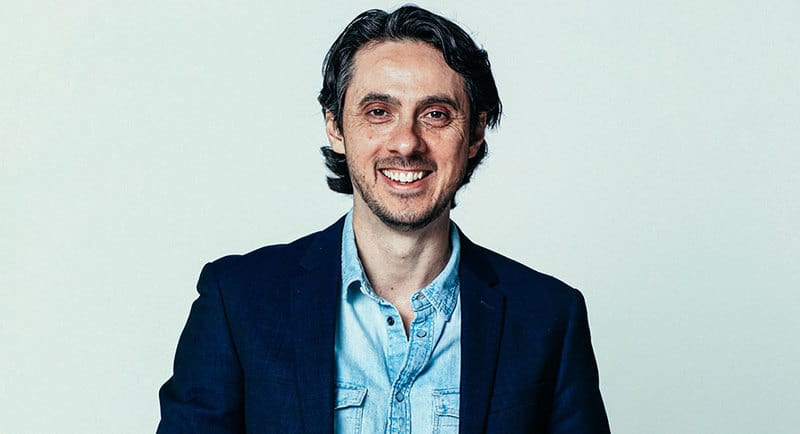
Alfie Lagos
As a business, we’re constantly signing up for new AI-powered platforms to address niche challenges. One tool refines audience targeting, another optimises creative assets, another automates reporting. Each of these adds value, but they don’t yet work together in a seamless, cohesive way.
The explosion of AI tools today feels like the discovery of the car’s many parts. The engine, the cabin, the electrical system. All being developed separately. The real transformation will come when AI brings these elements together into a unified and cohesive system, just like the wheel became truly revolutionary when it was integrated into a fully realised vehicle.
The hype is real, and the numbers back it up. AI adoption is surging, but the real story isn’t just in how many companies are using it. It’s in how they’re integrating it. In 2024, AI adoption among organisations worldwide reached 72 percent, a significant increase from 55 percent the previous year [1]. Generative AI has been embraced by 65 percent of organisations globally, highlighting its swift transition from an emerging trend to a mainstream business tool [1].
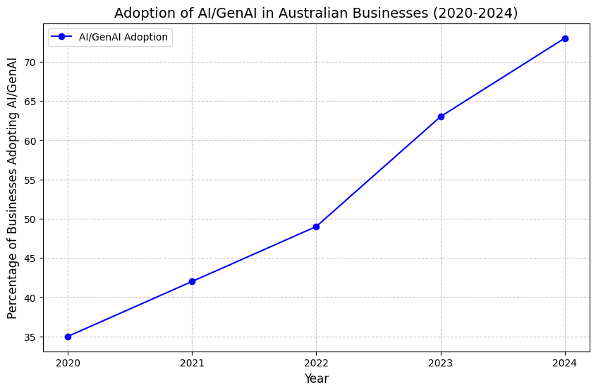
Source:Deloitte [4], Ipsos [5], McKinsey [6]
Global AI software revenue is predicted to grow at a compound annual growth rate of 34.9 percent, reaching $US100 billion by 2025 [2]. But what’s more telling is the parallel growth in platforms embedding AI. Software, marketing tools, business applications. That’s where the real shift is happening. AI isn’t just being used. It’s being built into the fabric of how technology functions.
This trend is evident in Australia’s business landscape. According to NAB’s 2025 SME Outlook, business owners are recognising the need to stay ahead of tech advancements, with 41 percent planning to increase tech adoption, and a third aiming to embed more AI into their operations, and strengthen cybersecurity protections [3]. Rachel Slade, NAB Group Executive for Business and Private Banking, emphasises that “the pace of technology adoption is transforming the business landscape, and business owners are keenly aware of its potential to help them grow, thrive, and adapt.”
The next stage of AI innovation
So, what does this mean? The real revolution won’t come from AI as a standalone tool but from AI as an invisible force embedded within everything we use. Just like the wheel became game-changing when attached to a vehicle, AI will become indispensable when seamlessly integrated into the software and workflows that run our world.
For the advertising and marketing industry, the implications are already clear. AI is supercharging teams by offloading some of the core knowledge requirements to models like OpenAI’s GPT, Gemini, and others. In-housing and streamlining marketing functions is becoming easier, and suddenly, every team has the equivalent of a mid-level marketing or advertising executive in the room.
But the real power lies in controlling and being accountable for AI’s output. Pushing critical decision-making to a black-box AI model that hallucinates or lacks context won’t work for brands that take this flippant approach. The real opportunity is using AI to generate well-informed, methodical, and justified decisions, wrapped in a clearly articulated brief.
Data privacy is another major consideration. Feeding critical client data into public LLMs presents risks, and we’re likely to see a rise in brands hosting their own models locally or within private environments to prevent sensitive data from bouncing across the globe. Balancing speed and quality of output is where the next stage of AI innovation will focus.
Right now, AI isn’t a polished wheel. It’s more like a triangle, rolling forward but still bumpy. The question isn’t whether it will change everything. It will. The real question is. Who’s going to smooth the edges and build the vehicle that makes AI truly useful?
References
[1] Statista (2024). AI Adoption Among Organizations Worldwide. Retrieved from Statista
[2] Demand Sage (2024). Artificial Intelligence Statistics. Retrieved from Demand Sage
[3] NAB (2024). 2025 SME Outlook. Retrieved from NAB News
[4] Deloitte Insights: “Generation AI in Asia Pacific”
[5] Google/Ipsos Survey: “AI Adoption in Australia: New Survey Reveals Increased Use & Belief in Potential”
[6] McKinsey & Company: “Generative AI and the Future of Work in Australia”
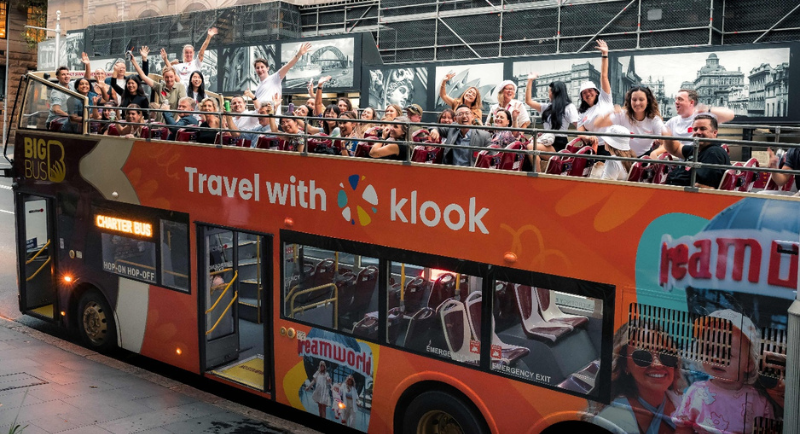
Klook unveils its agency village to boost presence across ANZ
Klook has launched its new agency village which sees four agencies join forces with the brand to bolster the travel experience platform’s growing presence across Australia and New Zealand
The platform has appointed Hatched as media agency, The Attention Seeker as social agency, and Paper Moose as creative agency. Klook will continue engagement of PR agency, The Lucid Agency, that has been retained by Klook since 2024.
“After many months of planning, discussions, and onboarding, we’re excited to bring our newly minted agency village together as we continue to scale our brand-building efforts in ANZ,” Mia Bacarro, Klook’s senior marketing manager, ANZ, said.
“During our selection process, we explored agencies that demonstrated creative thinking, an ability to understand our target audience and truly collaborative, like-minded people. We believe we’ve assembled nimble, dynamic and talented teams who mirror our love for travel and passion for growth.”
Strengthening Klook’s presence in Australia and New Zealand
Danni Dimitri, managing partner and head of strategy at Hatched, said: “From the moment we met Mia and the team, it was clear Klook was the kind of brand Hatched wanted to partner with. Great people, a dynamic business and a genuine focus on the customer experience. This is evidenced by their Klook Kreator program – connecting people to travel experiences in ways that feel accessible and celebrate what’s really possible when you travel.
“We are thrilled to be part of the indie agency collective Klook has selected. The integrated planning we’ve spent the last few months collaborating on is about to shake up the market in all the right ways.”
Nick Hunter, founder and CEO of Paper Moose, said: “We’re thrilled to be part of Klook’s agency village, collaborating with a dynamic group of independent agencies to drive incredible results for Klook. This first campaign sets the scene for building awareness across Australia & New Zealand with the launch of a new brand platform. We love working with challenger brands and like-minded agency partners and are looking forward to what is to come.”
Klook’s Agency Village has already commenced work on a new global brand campaign that will launch in the coming months.
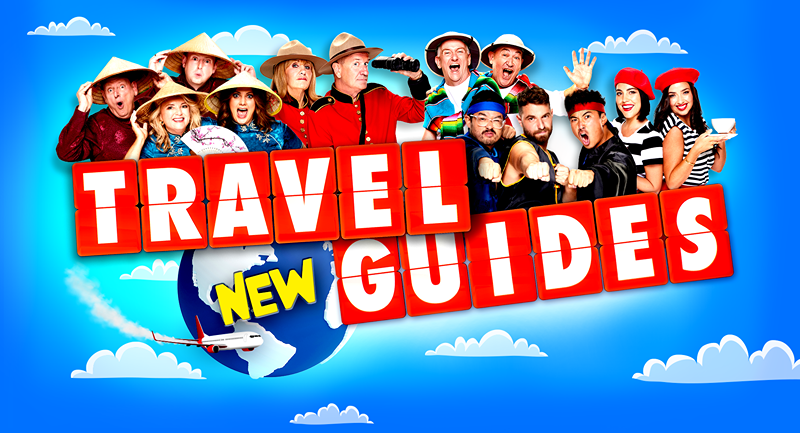
First look: Travel Guides returns with new destinations and adventures
Channel 9’s popular travel series Travel Guides is set to return for its eighth season, premiering on Monday, April 21, at 7.30pm on Channel 9 and 9Now. The new season promises a range of diverse travel experiences, spanning iconic global destinations and breathtaking local spots.
The latest season will take viewers from the bustling streets of New York City to the natural landscapes of Kakadu in the Northern Territory. The show’s travelers will also explore budget-friendly tourism in Thailand, the snowy vistas of the Swiss Alps, cultural hotspots in Japan, and the tropical paradise of Tahiti.
Returning to provide their distinct perspectives are familiar faces, including the Fren family, Matt and Brett, Kevin and Janetta, Kev, Dorian and Teng, and Karly and Bri. Known for their candid and varied reactions to each location, the guides will continue to assess accommodation, activities, local cuisine, and cultural practices through their uniquely Australian lens.
The season kicks off in New York City, where the guides dive into famous attractions such as Times Square, Central Park, the Statue of Liberty, and the 9/11 Memorial. From sampling pizza in Brooklyn to enjoying musical performances in the West Village, the guides are set to cover a wide range of experiences in what remains one of the world’s most vibrant cities.
As with previous seasons, Travel Guides aims to test the notion that what constitutes a perfect holiday can vary widely between individuals. The series continues to provide a mix of luxury experiences and more rugged adventures, capturing honest reactions along the way.
Last year, the show experienced its first unanimously perfect score, with all guides awarding the Cook Islands five out of five stars. Whether any of the ten trips in the new season will reach the same level of acclaim remains to be seen.
Travel Guides is produced by Nine and features narration from comedian Denise Scott.
Travel Guides Season 8 premieres on Monday, April 21, at 7.30pm on Channel 9 and 9Now.
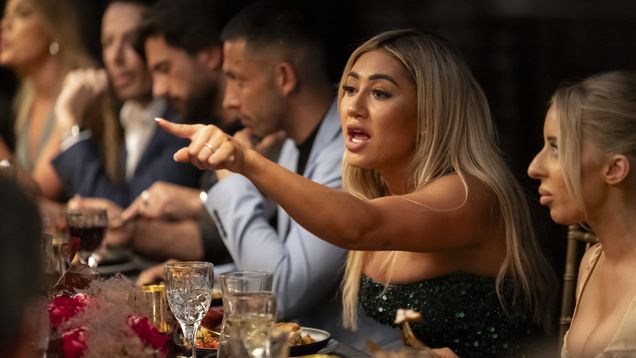
TV Ratings Sunday 6 April 2025: MAFS Final Dinner Party takes top spot
Total People TV Ratings
Nine’s Married At First Sight -The Final Dinner Party recorded a total TV national reach of 3,099,000, a total TV national audience of 1,894,000 and a BVOD audience of 493,000.
Seven’s Seven News recorded a total TV national reach of 2,498,000, a total TV national audience of 1,437,000 and a BVOD audience of 76,000.
Nine’s 9News recorded a total TV national reach of 2,391,000, a total TV national audience of 1,295,000 and a BVOD audience of 133,000.
Seven’s Australian Idol recorded a total TV national reach of 2,217,000, a total TV national audience of 1,073,000 and a BVOD audience of 96,000.
Nine’s 60 Minutes recorded a total TV national reach of 2,019,000, a total TV national audience of 825,000 and a BVOD audience of 120,000.
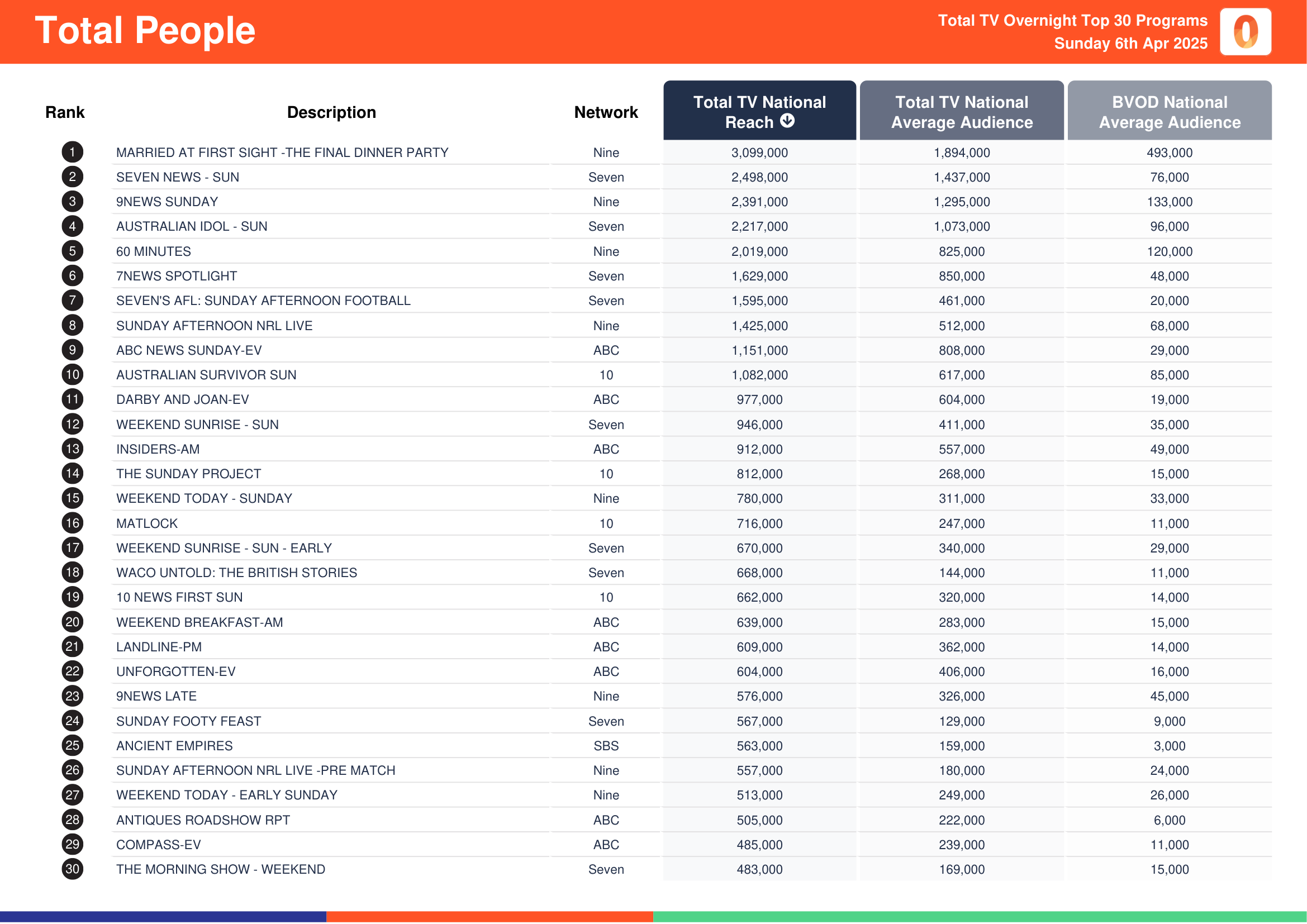
Total People 6 April 2025.
People 25-54
Nine’s Married At First Sight -The Final Dinner Party:
• Total TV national reach: 1,345,000
• National Audience: 926,000
• BVOD Audience: 310,000
Nine’s 60 Minutes:
• Total TV national reach: 851,000
• National Audience: 322,000
• BVOD Audience: 71,000
Nine’s 9News:
• Total TV national reach: 838,000
• National Audience: 415,000
• BVOD Audience: 73,000
Seven’s Seven News:
• Total TV national reach: 690,000
• National Audience: 368,000
• BVOD Audience: 38,000
Seven’s Australian Idol:
• Total TV national reach: 639,000
• National Audience: 299,000
• BVOD Audience: 48,000
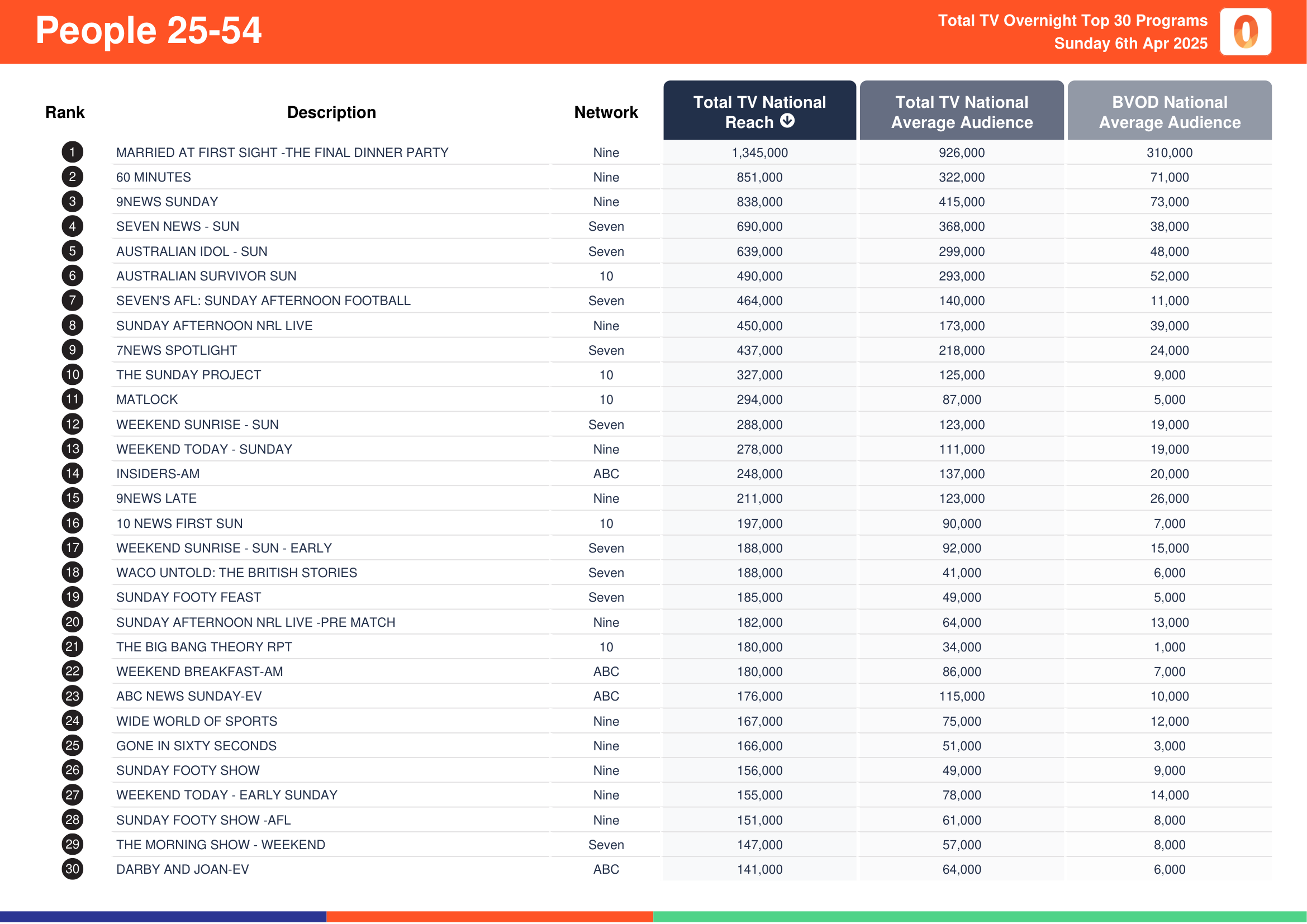
People 25-54 6 April 2025.
People 16-39
Nine’s Married At First Sight -The Final Dinner Party:
• Total TV national reach: 695,000
• National Audience: 507,000
• BVOD Audience: 217,000
Nine’s 60 Minutes:
• Total TV national reach: 407,000
• National Audience: 140,000
• BVOD Audience: 41,000
Nine’s 9News:
• Total TV national reach: 370,000
• National Audience: 163,000
• BVOD Audience: 40,000
Seven’s Seven News:
• Total TV national reach: 273,000
• National Audience: 116,000
• BVOD Audience: 18,000
Seven’s Australian Idol:
• Total TV national reach: 242,000
• National Audience: 116,000
• BVOD Audience: 22,000
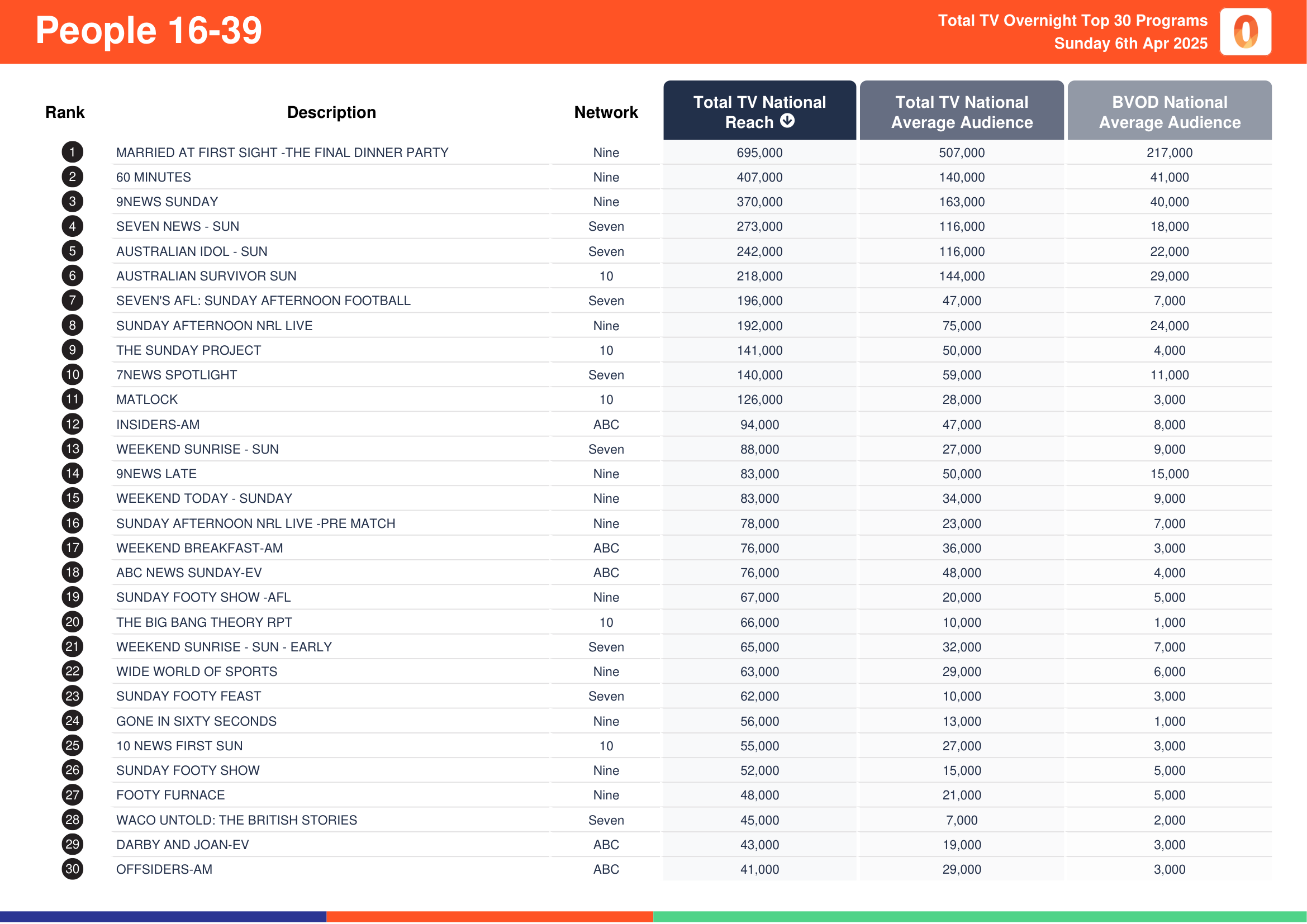
People 16-39 6 April 2025.
Grocery Shoppers 18+ TV Ratings
Nine’s Married At First Sight -The Final Dinner Party:
• Total TV national reach: 2,408,000
• National Audience: 1,507,000
• BVOD Audience: 394,000
Seven’s Seven News:
• Total TV national reach: 1,940,000
• National Audience: 1,139,000
• BVOD Audience: 61,000
Nine’s 9News:
• Total TV national reach: 1,868,000
• National Audience: 1,021,000
• BVOD Audience: 107,000
Seven’s Australian Idol:
• Total TV national reach: 1,718,000
• National Audience: 844,000
• BVOD Audience: 78,000
Nine’s 60 Minutes:
• Total TV national reach: 1,598,000
• National Audience: 663,000
• BVOD Audience: 97,000
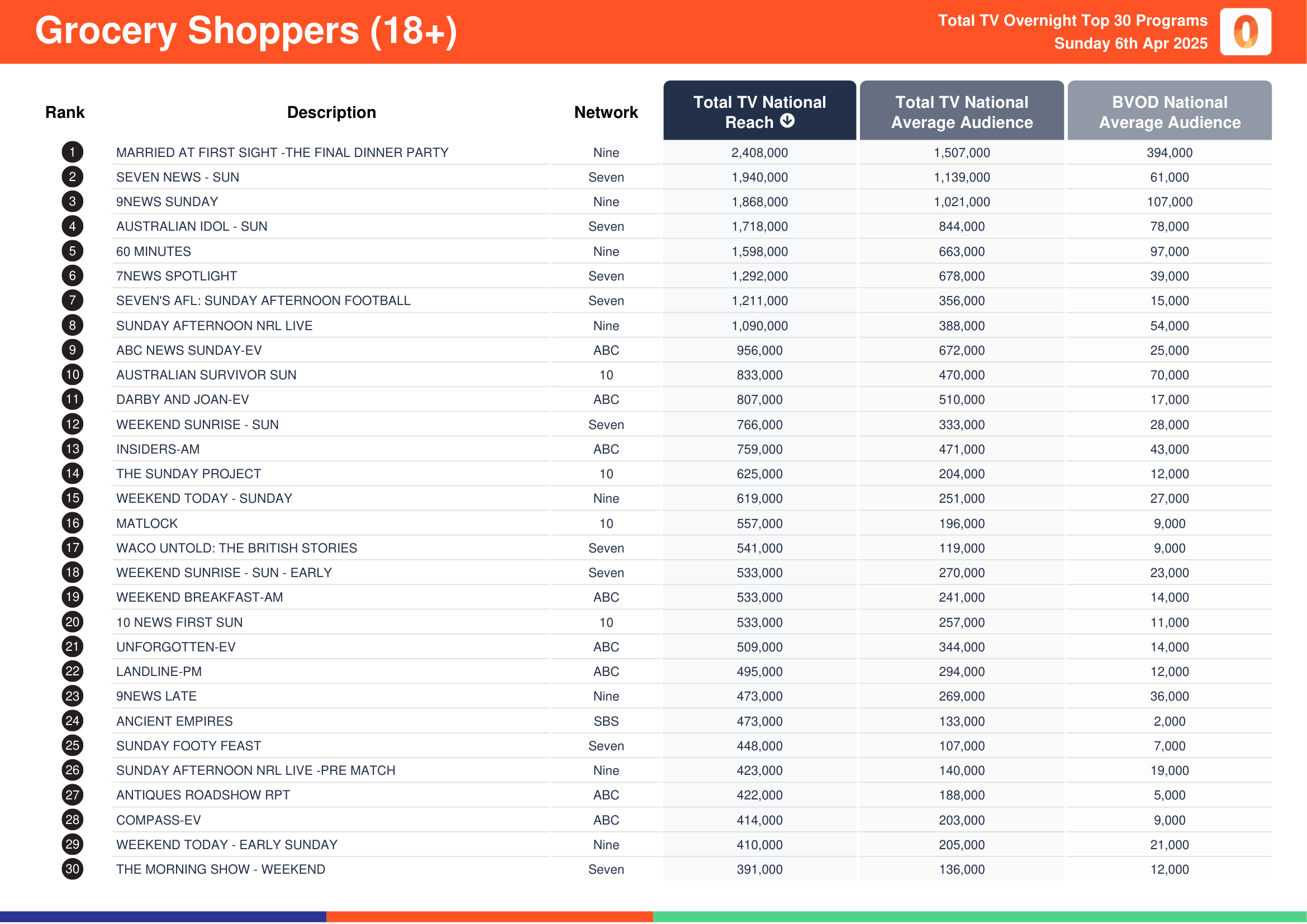
Grocery Shoppers (18+) 6 April 2025.
Data © OzTAM and Regional TAM 2025. Not to be reproduced, published or communicated (electronically or in hard copy) in whole or in part, without prior written consent of OzTAM and Regional TAM.
Trump Tariffs
Trump gives TikTok a reprieve as trade tensions deepen
As Michael Koziol writes in The Age, the Chinese-owned app, a major force in digital advertising, was facing renewed pressure to divest or disappear from US app stores.
Trump’s move buys TikTok another 75 days, marking the second extension since he took office.
Election 2025
Election ads go viral as politics turns platform-first
In response to the digital noise, The Australian Financial Review has launched #CampaignWatch, a rolling blog decoding how political messages are being crafted, targeted and amplified across platforms.
As Rachel Bolton reports, the blog will cover advertising tactics, influencer campaigns and the emerging slogans.
Legal
Lisa Wilkinson fires back as Lehrmann defamation appeal begins
As Michaela Whitbourn writes in The Age, her legal team labelled Lehrmann’s appeal “without merit” in documents filed with the Federal Court this week.
The case stems from Lehrmann’s failed defamation suit against Network Ten and Wilkinson over a 2021 Project interview with Brittany Higgins.
Tech
Gridsight raises $7.5m to help power a smarter energy grid
The company, founded by Dr Brendan Banfield, provides real-time data and analysis to more than half the country’s grid operators, reports Joseph Lam in The Australian.
The platform’s insights have already shaped Endeavour Energy’s Flexible Exports program, allowing homeowners to double the solar energy they export back to the grid, potentially unlocking up to $100 million in value.
How hackers struck super fund customers
According to Paul Smith in The Australian Financial Review, the breach, which siphoned off hundreds of thousands of dollars, relied on credential stuffing, a technique fuelled by reused passwords and digital complacency.
Sources say this wasn’t some high-tech hack.
Companies
Tech leaders say migration is key to growth, not a problem to solve
Both AirTrunk founder Robin Khuda, and Canva co-founder Cliff Obrecht believe the federal government should be more welcoming of immigrants
As Jared Lynch writes The Australian, for the tech and advertising industries, talent scarcity remains a top concern.
Brands
M&C Saatchi bets on culture as the next big brand metric
The global agency group has launched the Cultural Power Index, a tool designed to measure how well brands engage with, and influence, the shifting cultural landscape.
As Danielle Long writes in The Australian, the move reflects a growing reality in marketing: reach is no longer enough.
Meghan’s brand buzz backfires as honey sell-out stings fans
As Nika Shakhnazarova writes in The Daily Telegraph, her limited-edition A$47 wildflower honey and other boutique pantry items sold out within the hour, leaving many fans empty-handed despite having placed orders.
Customers who believed they’d secured products were later told stock had already sold out, prompting full refunds and a free item offer by way of apology.
Retail
Easter retail spend rises as Aussies prioritise travel, treats and tools
As Sean Cao writes in Inside Retail, new data from the Australian Retailers Association and Roy Morgan shows a $20 billion boost on the way, with food, travel and DIY projects leading the charge.
DIY is having a moment, with 6.2 million Aussies planning Easter weekend renovations and garden makeovers, driving a 27% jump in spending to $6.7 billion.
Television
Screen
Streaming delays put Australian screen sector on pause and under pressure
As Kyle Laidlaw writes in TV Blackbox, SPA’s latest industry survey shows confidence is plummeting, with 80% of producers reporting direct setbacks from the policy vacuum.
As traditional broadcasters pull back and streamers remain unregulated, many say the sector is caught in a holding pattern with no clear path forward.

